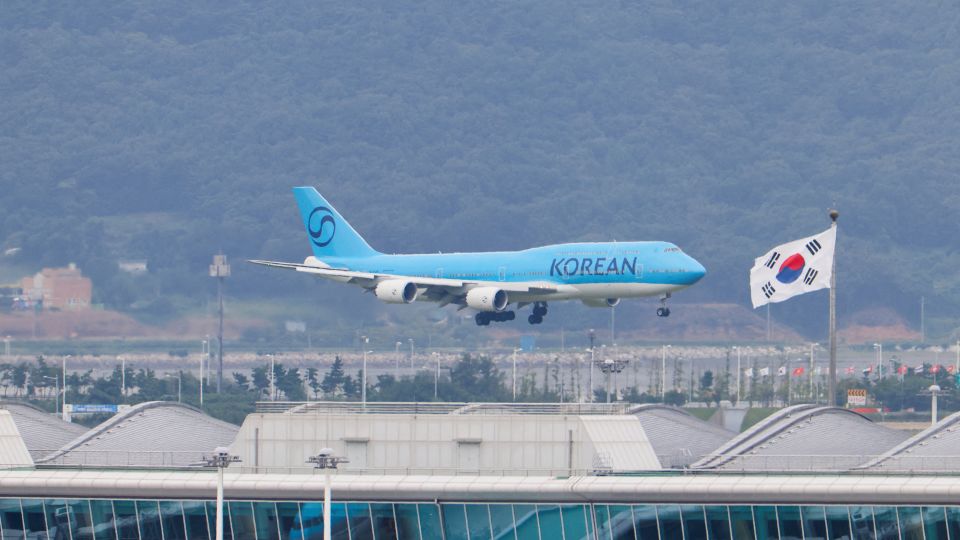More than 300 South Korean workers detained by immigration authorities in Georgia last week arrived home on Friday, marking the end of a saga that has stunned their nation and threatened to upend a close bilateral friendship between the US and South Korea.
The workers arrived at Seoul’s international airport after departing from Atlanta. A small crowd awaited their arrival in the airport – with one member putting up a tall banner that depicted an armed ICE agent carrying a gun and chain, and wearing a mask of US President Donald Trump’s face. “We ’re friends! Aren’t we?” the banner read.
It’s likely been a week of confusion and fear for the workers, who were chained up during the raid and held for days in detention.
But as they waited for news inside an ICE facility, the real maelstrom was happening outside – with South Korea’s top diplomat rushing to Washington to negotiate their release, while public fury swelled back home over what many see as a slap in the face from their longtime partner.
South Korea and the US have been staunch allies since the end of the Korean War in 1953 and have stepped up cooperation in recent years, drawing closer in a joint effort to combat Chinese influence in the Indo-Pacific. South Korea is also home to the US military’s largest overseas base, which houses 41,000 people including troops and their families.
So images of skilled workers being handcuffed and shackled by ICE agents have outraged many in South Korea and raised questions over the economic partnership that had led these detained workers to the US in the first place – a partnership Trump himself has encouraged.
This image from video provided by US Immigration and Customs Enforcement via DVIDS shows manufacturing plant employees waiting to have their legs shackled at the Hyundai plant in Ellabell, Georgia, on September 4, 2025. – Corey Bullard/AP
In August, a summit between Trump and South Korean President Lee Jae Myung yielded promises of billions of dollars of investment into the US from major Korean conglomerates. It’s unclear whether those deals are part of an earlier tariff deal that outlined a $350 billion investment flow from Korea to the US.
Auto manufacturer Hyundai was part of that investment effort, with Hyundai’s chairman pledging a $20 billion investment in the US after meeting Trump in March (and raising it by another $5 billion after the Lee-Trump summit in August).
Given Trump’s personal involvement in seeking greater Korean investment, many were stunned when ICE raided the battery plant co-owned by Hyundai and LG in Georgia.
It’s not clear what the workers’ visa statuses were. Immigration authorities claimed many had entered illegally or overstayed their visas, but lawyers for some of the detained workers insist their clients were legally working on the Georgia site, including on visa waivers that allow them to advise and consult.
It’s also not clear whether these workers will be allowed back to continue working, what the future of Korean investment in the US may look like, or what will become of the Hyundai plant.
South Korea’s Foreign Minister Cho Hyun this week urged Secretary of State Marco Rubio to allow the workers to re-enter the US and continue working at a later point, the foreign ministry said in a statement.
US officials gave a noncommittal response – saying they “respected this position and would promptly move forward with the repatriation schedule,” the statement said.
Lee, the Korean president, took a stronger tone on Thursday. He warned that the situation was “very confusing” for Korean companies in the US, would lead businesses to question “whether they should go at all,” and could have “considerable impact on foreign direct investment in the US.”
Negotiations are ongoing about the possibility of creating new visa categories or increasing visa quotas for South Korean workers, he added.
Meanwhile in Georgia, the battery plant is facing a minimum startup delay of two to three months, Hyundai CEO Jose Munoz said on Thursday in his first public comments since the raid, according to Reuters.
The site is slated to be Hyundai’s first fully electrified vehicle and battery manufacturing campus in the US, a project state leaders promised would bring 8,500 jobs and transform the rural economy.
That promise now feels increasingly tenuous; few of the permanent employees have been hired yet, the complex is still under construction, and most of the workforce are transient staff on temporary visas or contracts – like the ones swept up by ICE.
In the Reuters report, Munoz said many of the detained workers were mainly employed by suppliers of LG, and that Hyundai will source batteries from other plants in the meantime.
But even if the plant slowly returns to life, the sense of betrayal in South Korea – and a new wariness among companies there to invest in the US – may linger far longer.
For more CNN news and newsletters create an account at CNN.com

